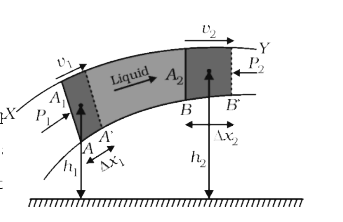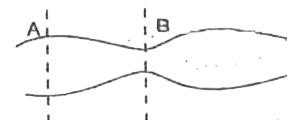State and prove Bernouli's theorem.
Video Solution
Text Solution
For the streamline flow of an ideal liquid, the sum of the pressure energy per unit volume, potential energy per unit volume and kinetic energy per unit volume is always constant, whereas an ideal liquid is one which is incompressible and can flow from one place to another without friction.
Proof of Bernoulli’s Theorem :
Let us consider a tube XY through which a liquid is having streamline flow as shown in figure.
Let P1,P2 = pressures at the sections A and B respectively,
A1,A2 = areas of cross-section of tube at A and B respectively,
h1,h2 = heights of the cross-section A and B respectively.
As the liquid flows from A to B, P1>P2
Since the liquid is incompressible, when it flows from AB to A'B' (where ∀'=Δx1andBB'=Δx2) , Volume of the liquid between ∀' = volume of the liquid between BB' =ΔV (say ) where
ΔV=A1Δx1=A2Δx2
Further, according to the equation of continuity, A1v1=A2v2, since A2<A1,v2>v1
Thus, the velocity (v2) at B is more than velocity (v1) at A
Force acting on the liquid at the A=P1A1
Work done by the pressure force P1A1 in driving a volume ΔV through a distance Δx1i.e.,
W1=P1A1Δx1=P1ΔV(asA1Δx1=ΔV)
Similarly, work done by the liquid in driving a volume ΔV through a distance Δx2 ,i.e.,
W2=P2A2Δx2=P2ΔV(asA1Δx2=ΔV)
Net work done by the pressure force in driving a volume ΔV of the liquid i.e.,
ΔW=W1−W2=P1ΔV−P2ΔV ...(i) Let Δm be the mass of the volume Δv of the liquid.
since h2→h1 increase in PE of the liquid , i.e, ΔU=(Δm)gh2−(Δm)gh1 ...(ii)
Since v2>v1 , increase in KE of the liquid, i.e, ΔK=12(Δm)v22−12(Δm)v21 ...(iii)
According to work - energy theorem , ΔW=ΔU+ΔK ...(iv)
From Equations (i), (ii), (iii) and (iv), we get P1ΔV−P2ΔV=(Δm)gh2−(Δm)gh1+12(Δm)v22−12(Δm)v21
Dividing both sides by ΔV, We get P1−P2=ρgh2−ρgh1+12ρv22−12ρv21
where ρ=Δm/ΔV = density of the fluid . thus , P1+ρgh1+12ρv21=P2+ρgh2+12ρv22 ...(v)
or P + ρgh+12ρv2 = constant. this is Bernoulli's theorem.

|
Topper's Solved these Questions
- LIQUIDSBOOK - VMC MODULES ENGLISHCHAPTER - LIQUIDSEXERCISE - LEVEL -1
90 Videos
- LIQUIDSBOOK - VMC MODULES ENGLISHCHAPTER - LIQUIDSEXERCISE - LEVEL -2
50 Videos
- LIQUIDSBOOK - VMC MODULES ENGLISHCHAPTER - LIQUIDSEXERCISE - LEVEL-0 ( Short Answer Type - I )
7 Videos
- LAWS OF MOTION BOOK - VMC MODULES ENGLISHCHAPTER - LAWS OF MOTION EXERCISE - IMPECCABLE
53 Videos
- MAGNETIC EFFECTS OF CURRENT BOOK - VMC MODULES ENGLISHCHAPTER - MAGNETIC EFFECTS OF CURRENT EXERCISE - JEE Advanced (Archive)
78 Videos
Similar Questions
Knowledge Check
Applications of Bernoulli's theorem can be seen in
A1. dynamic lift of aeroplaneB2. hydraulic pressC3. helicopterD4. none of these
State basic proportionality theorem and its converse.
View Solution(a) State the basic proportionality theorem.
(b) state the mid-point theorem.
© State pythagoras theorem.
(d) State the conditions for similarity of two triangles.
View SolutionState (i) parallel axes theorem and (ii) perpendicular axes theorem.
View SolutionExplain Torricelli's theorem
View SolutionState Bayes Theorem
View SolutionState and prove law of equipartition of energy.
View SolutionState and prove the law of conservation of angular momentum.
View Solution

